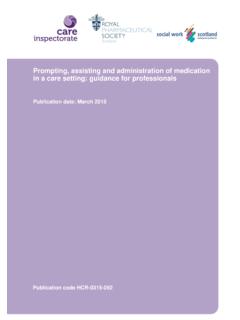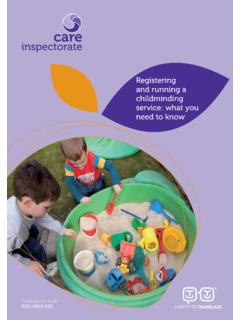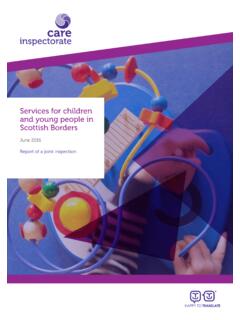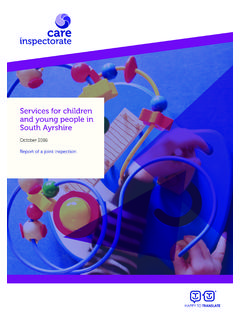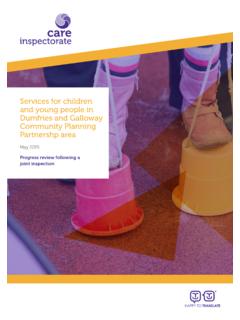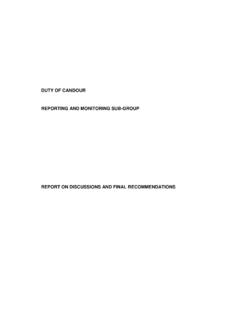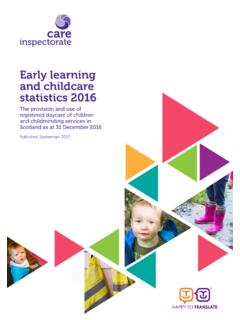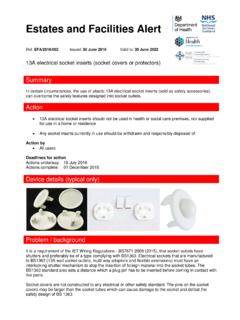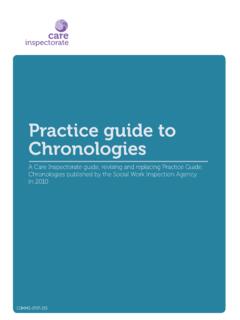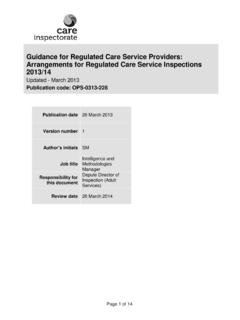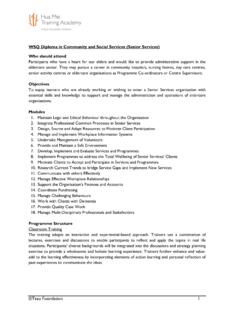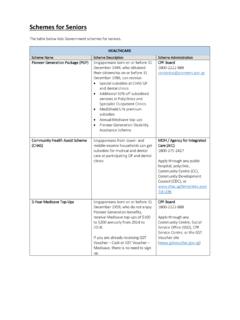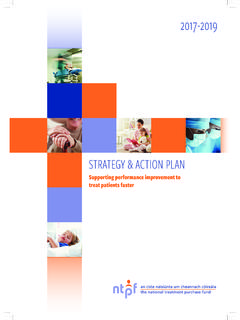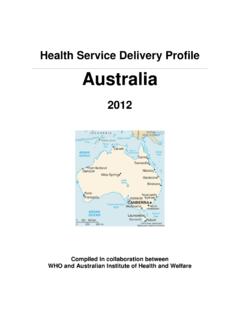Transcription of Applying to register a care service - Care Inspectorate
1 Publication codeREG-1011-022 Applying to register a care serviceGuidance for applicantsContentsIntroduction 2 services regulated by the care Inspectorate 5 Registration process 91 IntroductionAbout the care InspectorateThe care Inspectorate was set up in April 2011 to regulate care and social work services in Scotland under the Public services Reform (Scotland) Act 2010 (the Act).Our purpose is to regulate for the improvement of care and social work in Scotland. Our aim is to raise standards of care and social work by involving people who are cared for, their families and carers and those who provide principles are: keeping people safe promoting dignity and choice supporting vision is for care services to: improve people s lives be easy to reach and there when needed be innovative support independence offer choice be staffed by competent, reliable and trustworthy main activities are:RegistrationNew care services must be registered with us before they can begin delivering inspect all social work services and registered care services to timescales agreed with the Scottish Government to monitor the quality of care given to people who use the services .
2 We produce inspection reports after each inspection. Investigating complaints Anyone can make a complaint about any care service regulated by the care Inspectorate or about the care Inspectorate take action to force services to improve the quality of their care . Otherwise, we can close them care Inspectorate : provides information to the public and to Scottish Ministers about the availability and quality of care services and social work services takes the National care Standards into account takes the Codes of Practice issued by the Scottish Social services Council (SSSC) into account consults with the SSSC when carrying out its tasks. For more information visit About the National care StandardsEach service type has its own National care Standards, decided and published by Scottish Government, that set out what people can expect to receive. We inspect care services against the National care Standards. You can find the definitions of care service types and the standards that apply to them on page 4 of this can get copies of the National care Standards from: Booksource50 Cambuslang RoadCambuslang Investment ParkGlasgowG32 8 NBtelephone 0845 370 0067email: or download from and follow the link for the National care registrationWe have produced this guide to help those who want to register and operate a care service in Scotland.
3 It is an offence under the Act to provide a care service that is not registered with us. We give information and advice to people who provide care services , or who are considering becoming care service providers. It is your responsibility to get relevant professional advice, such as legal, financial or architectural advice, before you apply. We advise that you don t make any financial or business commitment before your registration is granted. To stay registered you must continue to deliver a standard of care that meets the National care Standards and which complies with current legislation and other good practice part of the registration process we check: whether the applicant and manager of the proposed care service are fit to provide or manage a care service . This includes assessing a potential provider s integrity, character and financial background and where the applicant will also manage the service , assessing their skills, knowledge and experience. whether the premises in which the proposed care service will be provided are fit to be used for that purpose.
4 That the proposed service will make all the proper provisions for the health, welfare, independence, choice, privacy and dignity of everyone using the service . The fees you must payYou must pay a fee when you apply. This is non-returnable and we will not process your application until we receive your registered care services must also pay an annual continuation fee. For more information, please read our fees leaflet. You must also pay for all PVG Scheme Record/Disclosure Scotland checks and bank fees incurred during the application process. The following types of care services must be registered with the care Inspectorate . Applicants must also refer to the Public services Reform (Scotland) Act 2010, schedule regulated by the care Inspectorate1. Childcare Daycare of children A service which provides care for children on non-domestic premises for a total of more than two hours per day and on at least six days per year. Includes nursery classes, cr ches, after school clubs and play groups and can be run on a public, private or voluntary basis.
5 This definition does not include services which are part of school activities. Nor does it include activities where care is not provided such as sports clubs or uniformed activities such as Scouts or Guides. National care Standards: Early education & childcare up to age 16 Childminding The provider of a childminding service is a person that looks after at least one child (up to the age of 16 years) for more than a total of two hours per day. They are paid to look after the child on domestic premises (usually their own home). Someone who looks after the child in the home of the child s parent(s) is not providing a childminding service . A parent, relative or foster carer who is caring for a child is not providing a childminding service . National care Standards: Early education & childcare up to age 16 Childcare agency A child care agency supplies or introduces to parents someone who looks after a child up to the age of 16, wholly or mainly in the home of that child s parents.
6 The care may occur regularly or occasionally and the carer may operate on a paid or voluntary basis. Childcare agency does not include nurse agencies. Examples of childcare agencies are: nanny agencies and sitter services . National care Standards: Childcare agencies School care accommodation service This service consists of providing accommodation to a pupil by a local authority or by an independent/grant-aided school. The accommodation is provided to enable the pupil to attend school. If the accommodation is provided by an independent school, this will only be regarded as a school care accommodation service if the pupil is also provided with personal care or support. For example a school for primary school aged children with emotional and behavioural problems provided by an independent provider. Local authority hostels are excluded from the definition as are special schools within the meaning of the Education (Scotland) Act 1980. National care Standards: School care accommodation services 5 Secure accommodation service A service requiring the approval of the Scottish Ministers for providing and using accommodation to restrict the liberty of children in residential premises where care services are provided.
7 National care Standards: School care accommodation services 2. Adoption and fostering Adoption service A service involved in making arrangements in connection with the adoption of children. Includes both local authority and not for profit adoption services . It does not include services where the proposed adopter is a relative of the child. National care Standards: Adoption services Fostering service A fostering service may provide a wide range of services in respect of children who are looked after by the local authority. The service is provided by a local authority or, on the local authority s behalf, by a voluntary organisation or a private not-for-profit organisation. The care Inspectorate also regulates the services provided by the local authority in relation to private fostering arrangements. Fostering services may include recruiting, selecting, training and supporting foster carers; matching children to foster carers; monitoring, and providing support for, foster carers.
8 Examples of fostering services are services which deliver long-term placements or short breaks; substitute care where a child s family is unable to provide care ; complementary care to provide additional opportunities for a child; respite care to give parents a break; supporting kinship care . National care Standards: Foster care and family placement services 3. services for people who need care and accommodation care home service A service providing accommodation which includes nursing care , personal care or personal support to vulnerable children or adults. Hospitals and schools are not care at home services . Types of care homes include: care homes for people with physical and sensory impairments care homes for older people care homes for people with learning disabilities care homes for children and young people care homes for people with drug and alcohol misuse problems 6 care homes for people with mental health problems Short breaks and respite care services for adults There are National care Standards for each of the types of care homes listed above.
9 Their titles are thesame as the list above. Adult placement service A service which arranges accommodation and support for vulnerable adults (aged 16 or over) by placing them in the homes of families or individuals. The adult placement carer takes a vulnerable adult into his or her home where they will be part of the household, and where there is support and care . The adult placement service continues to make sure that both the person using the service and the carer receive support and help. National care Standards: Adult placement services 4. care while remaining at home Support service A support service is a service provided to a person who is vulnerable, except where they are only vulnerable because they are young. The service could be provided within the person s home, for instance a bathing service , or it may be provided out with the person s home, for example in the community or in a day centre. It includes counselling, provided this is part of a planned programme of care .
10 It does not include: services providing overnight accommodation adoption/fostering services independent health care services employment assistance services a health body providing a service conferred by the National Health service services provided solely and personally by an individual National care Standards: Support services National care Standards: care at home National care Standards: Short breaks and respite care services for adults Housing support service A service which provides support, assistance, advice or counselling to enable a person to live in their own home in the community. Housing support may be provided to people living in, for example, sheltered housing, hostels for the homeless, accommodation for the learning disabled, women s refuges or in shared homes. National care Standards: Housing support services 7 Offender accommodation service A service which provides advice, guidance or assistance to people such as ex-offenders, people on probation or those released from prison, who have been provided with accommodation by the local authority.
